过去分词和现在分词作宾语补足语汇总.
- 格式:ppt
- 大小:423.50 KB
- 文档页数:5
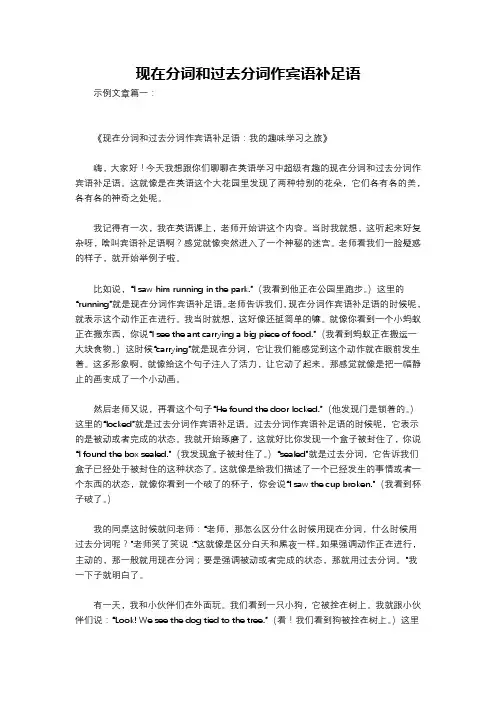
现在分词和过去分词作宾语补足语示例文章篇一:《现在分词和过去分词作宾语补足语:我的趣味学习之旅》嗨,大家好!今天我想跟你们聊聊在英语学习中超级有趣的现在分词和过去分词作宾语补足语。
这就像是在英语这个大花园里发现了两种特别的花朵,它们各有各的美,各有各的神奇之处呢。
我记得有一次,我在英语课上,老师开始讲这个内容。
当时我就想,这听起来好复杂呀,啥叫宾语补足语啊?感觉就像突然进入了一个神秘的迷宫。
老师看我们一脸疑惑的样子,就开始举例子啦。
比如说,“I saw him running in the park.”(我看到他正在公园里跑步。
)这里的“running”就是现在分词作宾语补足语。
老师告诉我们,现在分词作宾语补足语的时候呢,就表示这个动作正在进行。
我当时就想,这好像还挺简单的嘛。
就像你看到一个小蚂蚁正在搬东西,你说“I see the ant carrying a big piece of food.”(我看到蚂蚁正在搬运一大块食物。
)这时候“carrying”就是现在分词,它让我们能感觉到这个动作就在眼前发生着。
这多形象啊,就像给这个句子注入了活力,让它动了起来。
那感觉就像是把一幅静止的画变成了一个小动画。
然后老师又说,再看这个句子“He found the door locked.”(他发现门是锁着的。
)这里的“locked”就是过去分词作宾语补足语。
过去分词作宾语补足语的时候呢,它表示的是被动或者完成的状态。
我就开始琢磨了,这就好比你发现一个盒子被封住了,你说“I found the box sealed.”(我发现盒子被封住了。
)“sealed”就是过去分词,它告诉我们盒子已经处于被封住的这种状态了。
这就像是给我们描述了一个已经发生的事情或者一个东西的状态,就像你看到一个破了的杯子,你会说“I saw the cup broken.”(我看到杯子破了。
)我的同桌这时候就问老师:“老师,那怎么区分什么时候用现在分词,什么时候用过去分词呢?”老师笑了笑说:“这就像是区分白天和黑夜一样。
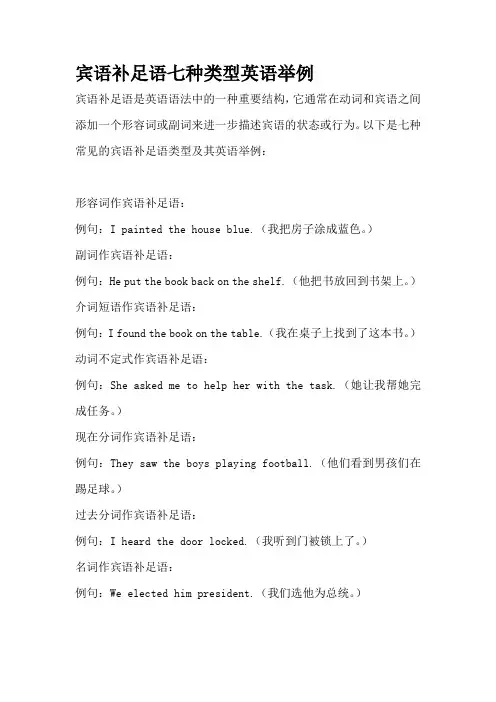
宾语补足语七种类型英语举例
宾语补足语是英语语法中的一种重要结构,它通常在动词和宾语之间添加一个形容词或副词来进一步描述宾语的状态或行为。
以下是七种常见的宾语补足语类型及其英语举例:
形容词作宾语补足语:
例句:I painted the house blue.(我把房子涂成蓝色。
)
副词作宾语补足语:
例句:He put the book back on the shelf.(他把书放回到书架上。
)介词短语作宾语补足语:
例句:I found the book on the table.(我在桌子上找到了这本书。
)动词不定式作宾语补足语:
例句:She asked me to help her with the task.(她让我帮她完成任务。
)
现在分词作宾语补足语:
例句:They saw the boys playing football.(他们看到男孩们在踢足球。
)
过去分词作宾语补足语:
例句:I heard the door locked.(我听到门被锁上了。
)
名词作宾语补足语:
例句:We elected him president.(我们选他为总统。
)
这些是七种常见的宾语补足语类型,每种都有不同的用法和特点。
理解这些结构可以帮助更好地掌握英语语法。
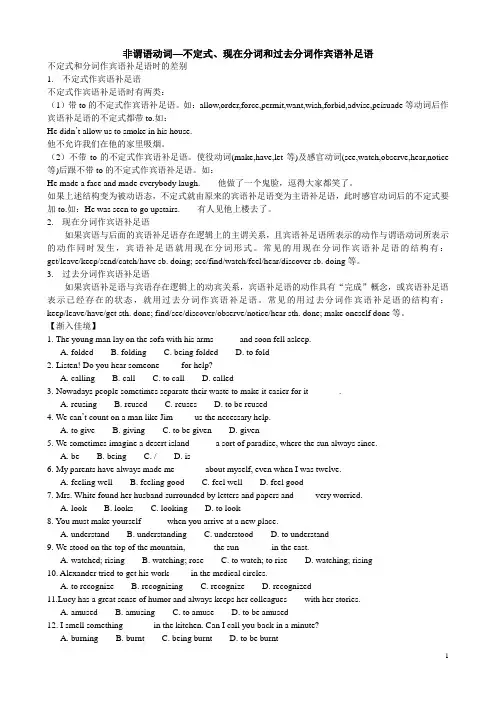
非谓语动词—不定式、现在分词和过去分词作宾语补足语不定式和分词作宾语补足语时的差别1.不定式作宾语补足语不定式作宾语补足语时有两类:(1)带to的不定式作宾语补足语。
如:allow,order,force,permit,want,wish,forbid,advise,peisuade等动词后作宾语补足语的不定式都带to.如:He didn’t allow us to smoke in his house.他不允许我们在他的家里吸烟。
(2)不带to的不定式作宾语补足语。
使役动词(make,have,let等)及感官动词(see,watch,observe,hear,notice 等)后跟不带to的不定式作宾语补足语。
如:He made a face and made everybody laugh. 他做了一个鬼脸,逗得大家都笑了。
如果上述结构变为被动语态,不定式就由原来的宾语补足语变为主语补足语,此时感官动词后的不定式要加to.如:He was seen to go upstairs. 有人见他上楼去了。
2.现在分词作宾语补足语如果宾语与后面的宾语补足语存在逻辑上的主谓关系,且宾语补足语所表示的动作与谓语动词所表示的动作同时发生,宾语补足语就用现在分词形式。
常见的用现在分词作宾语补足语的结构有:get/leave/keep/send/catch/have sb. doing; see/find/watch/feel/hear/discover sb. doing等。
3.过去分词作宾语补足语如果宾语补足语与宾语存在逻辑上的动宾关系,宾语补足语的动作具有“完成”概念,或宾语补足语表示已经存在的状态,就用过去分词作宾语补足语。
常见的用过去分词作宾语补足语的结构有:keep/leave/have/get sth. done; find/see/discover/observe/notice/hear sth. done; make oneself done等。
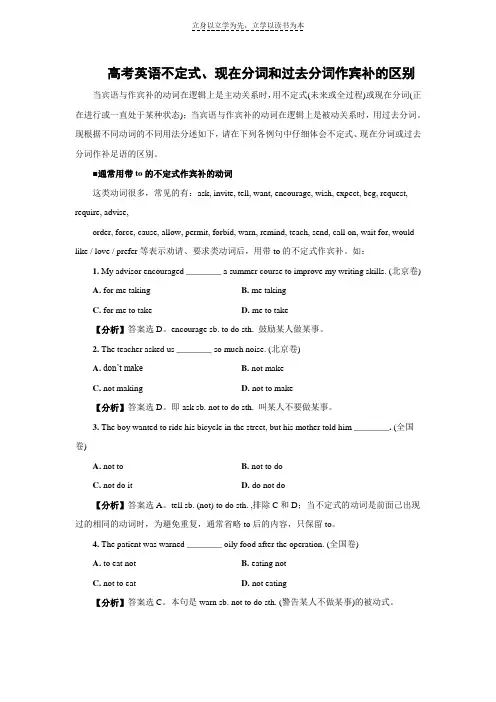
高考英语不定式、现在分词和过去分词作宾补的区别当宾语与作宾补的动词在逻辑上是主动关系时,用不定式(未来或全过程)或现在分词(正在进行或一直处于某种状态);当宾语与作宾补的动词在逻辑上是被动关系时,用过去分词。
现根据不同动词的不同用法分述如下,请在下列各例句中仔细体会不定式、现在分词或过去分词作补足语的区别。
■通常用带to的不定式作宾补的动词这类动词很多,常见的有:ask, invite, tell, want, encourage, wish, expect, beg, request, require, advise,order, force, cause, allow, permit, forbid, warn, remind, teach, send, call on, wait for, would like / love / prefer等表示劝请、要求类动词后,用带to的不定式作宾补。
如:1. My advisor encouraged ________ a summer course to improve my writing skills. (北京卷)A. for me takingB. me takingC. for me to takeD. me to take【分析】答案选D。
encourage sb. to do sth. 鼓励某人做某事。
2. The teacher asked us ________ so much noise. (北京卷)A. don’t makeB. not makeC. not makingD. not to make【分析】答案选D。
即ask sb. not to do sth. 叫某人不要做某事。
3. The boy wanted to ride his bicycle in the street, but his mother told him ________. (全国卷)A. not toB. not to doC. not do itD. do not do【分析】答案选A。
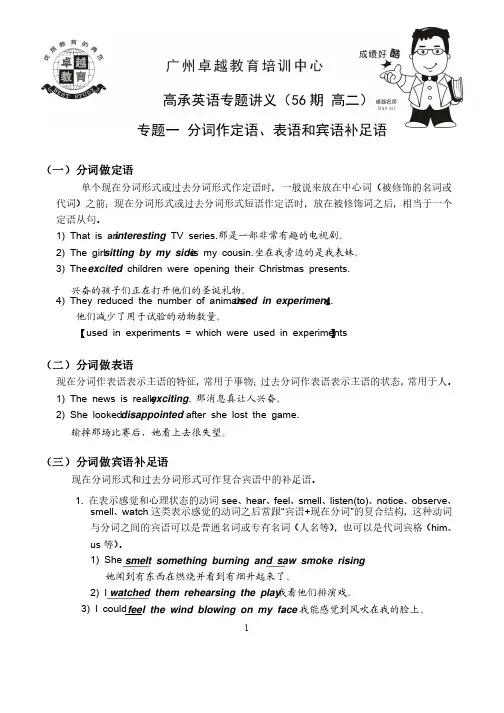
1 高承英语专题讲义(高承英语专题讲义(5656期高二)专题一分词作定语、表语和宾语补足语(一)分词做定语单个现在分词形式或过去分词形式作定语时,一般说来放在中心词(被修饰的名词或代词)之前;现在分词形式或过去分词形式短语作定语时,现在分词形式或过去分词形式短语作定语时,放在被修饰词之后,放在被修饰词之后,放在被修饰词之后,相当于一个相当于一个定语从句。
1) That is an interesting TV series. 那是一部非常有趣的电视剧。
那是一部非常有趣的电视剧。
2) The girl s itting sitting by my side is my cousin. 坐在我旁边的是我表妹。
坐在我旁边的是我表妹。
3) The excited children were opening their Christmas presents. 兴奋的孩子们正在打开他们的圣诞礼物。
4) They reduced the number of animals used in experiment s . 他们减少了用于试验的动物数量。
【used in experiments = which were used in experiments 】(二)分词做表语现在分词作表语表示主语的特征,常用于事物;过去分词作表语表示主语的状态,常用于人。
1) The news is really exciting . 那消息真让人兴奋。
2) She looked disappointed after she lost the game. 输掉那场比赛后,她看上去很失望。
(三)分词做宾语补足语现在分词形式和过去分词形式可作复合宾语中的补足语。
1. 在表示感觉和心理状态的动词see 、hear 、feel 、smell 、listen(to)、notice 、observe 、smell 、watch 这类表示感觉的动词之后常跟“宾语+现在分词”的复合结构,这种动词与分词之间的宾语可以是普通名词或专有名词(人名等),也可以是代词宾格(him 、us 等)。
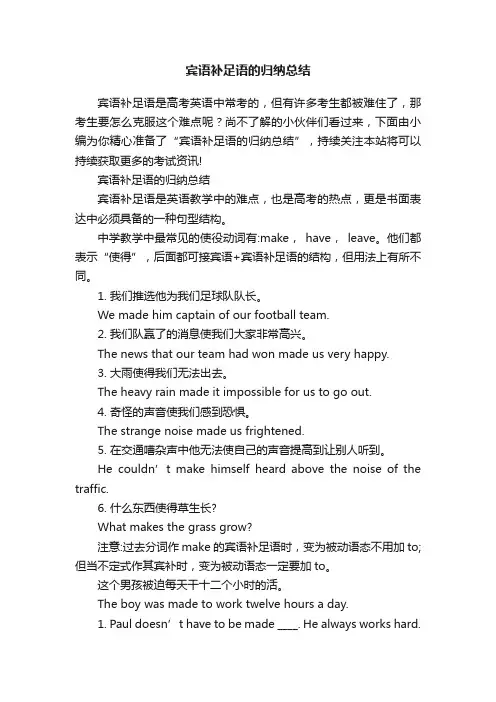
宾语补足语的归纳总结宾语补足语是高考英语中常考的,但有许多考生都被难住了,那考生要怎么克服这个难点呢?尚不了解的小伙伴们看过来,下面由小编为你精心准备了“宾语补足语的归纳总结”,持续关注本站将可以持续获取更多的考试资讯!宾语补足语的归纳总结宾语补足语是英语教学中的难点,也是高考的热点,更是书面表达中必须具备的一种句型结构。
中学教学中最常见的使役动词有:make,have,leave。
他们都表示“使得”,后面都可接宾语+宾语补足语的结构,但用法上有所不同。
1. 我们推选他为我们足球队队长。
We made him captain of our football team.2. 我们队赢了的消息使我们大家非常高兴。
The news that our team had won made us very happy.3. 大雨使得我们无法出去。
The heavy rain made it impossible for us to go out.4. 奇怪的声音使我们感到恐惧。
The strange noise made us frightened.5. 在交通嘈杂声中他无法使自己的声音提高到让别人听到。
He couldn’t make himself heard above the noise of the traffic.6. 什么东西使得草生长?What makes the grass grow?注意:过去分词作make的宾语补足语时,变为被动语态不用加to; 但当不定式作其宾补时,变为被动语态一定要加to。
这个男孩被迫每天干十二个小时的活。
The boy was made to work twelve hours a day.1. Paul doesn’t have to be made ____. He always works hard.A. learnB. to learnC. learnedD. learning2. The result of the entrance exams was not made ____ to the public until last Thursday.A. knowingB. knownC. to knowD. to be known答案:1.B2.Bhave sb. do sth.使得某人做某事have sb. doing sth.使得某人一直做某事have sth. done使得某事被做1. The teacher had her ____(recite) the text again.2. He wants to have his eyes ____(examine) tomorrow.3. Be careful, or you’ll have your hands ____(hurt).4. He had the girl ____(stand) in the classroom the whole morning.5. He had the walls ____(paint) this morning.答案:1.recite 2.examined 3.hurt 4.standing 5.painted只能用doing的情况1. 表示正在发生Be quick. They have the car waiting for you at the school gate.2. 否定句中表示(不能)容忍某人做……Iwon’t have him cheating in the exam.3. 表示某一时间内一直延续不断的动作He had us laughing all through the meals.1. I’ve had my radio ____ so soon because my father had me ____ it. A. repair; done B. repaired; do C. repairing; do D. repaired; done2. You can’t have the horse ____ all the way. It’s too hot.A. runB. to runC. runningD. to be running3. Mrs. Brown was much disappointed to see the washing machine she had had ____ went wrong again.A. itB. it repairedC. repairedD. to be repaired4. We will have you ____(know) that the machine has been made ____(work) at full speed.答案:1.B 2.C 3.C 4.know, to work1. 用形容词作宾语补足语出去时,不要关门。

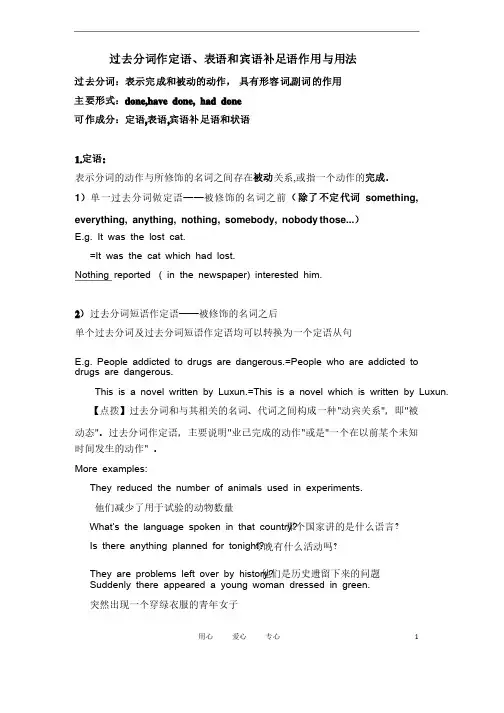
用心爱心专心1 过去分词作定语、表语和宾语补足语作用与用法过去分词:表示完成和被动的动作,具有形容词.副词的作用主要形式:done,have done, had done可作成分:定语,表语,宾语补足语和状语1.定语:表示分词的动作与所修饰的名词之间存在被动关系,或指一个动作的完成。
1)单一过去分词做定语——被修饰的名词之前(除了不定代词something, everything, anything, nothing, somebody, nobody ,those...)E.g. It was the lost cat. =It was the cat which had lost. Nothing reported ( in the newspaper) interested him. 2)过去分词短语作定语——被修饰的名词之后单个过去分词及过去分词短语作定语均可以转换为一个定语从句E.g. E.g. People People People addicted addicted addicted to to to drugs drugs drugs are are are dangerous.=People dangerous.=People dangerous.=People who who who are are are addicted addicted addicted to to drugs are dangerous. This is a novel written by Luxun.=This is a novel which is written by Luxun. 【点拨】过去分词和与其相关的名词、代词之间构成一种"动宾关系",即"被动态"。
过去分词作定语,主要说明"业已完成的动作"或是"一个在以前某个未知时间发生的动作" 。
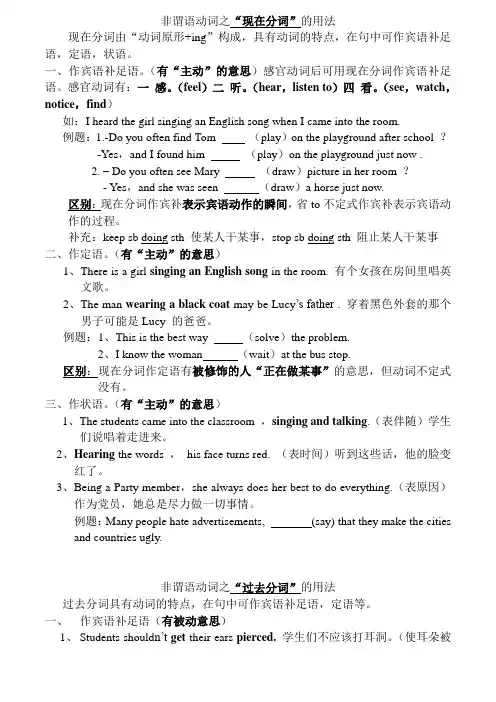
非谓语动词之“现在分词”的用法现在分词由“动词原形+ing”构成,具有动词的特点,在句中可作宾语补足语,定语,状语。
一、作宾语补足语。
(有“主动”的意思)感官动词后可用现在分词作宾语补足语。
感官动词有:一感。
(feel)二听。
(hear,listen to)四看。
(see,watch,notice,find)如:I heard the girl singing an English song when I came into the room.例题:1.-Do you often find Tom (play)on the playground after school ?-Y es,and I found him (play)on the playground just now .2. – Do you often see Mary (draw)picture in her room ?- Y es,and she was seen (draw)a horse just now.区别:现在分词作宾补表示宾语动作的瞬间,省to不定式作宾补表示宾语动作的过程。
补充:keep sb doing sth 使某人干某事,stop sb doing sth 阻止某人干某事二、作定语。
(有“主动”的意思)1、There is a girl singing an English song in the room. 有个女孩在房间里唱英文歌。
2、The man wearing a black coat may be Lucy’s father .穿着黑色外套的那个男子可能是Lucy 的爸爸。
例题:1、This is the best way (solve)the problem.2、I know the woman (wait)at the bus stop.区别:现在分词作定语有被修饰的人“正在做某事”的意思,但动词不定式没有。
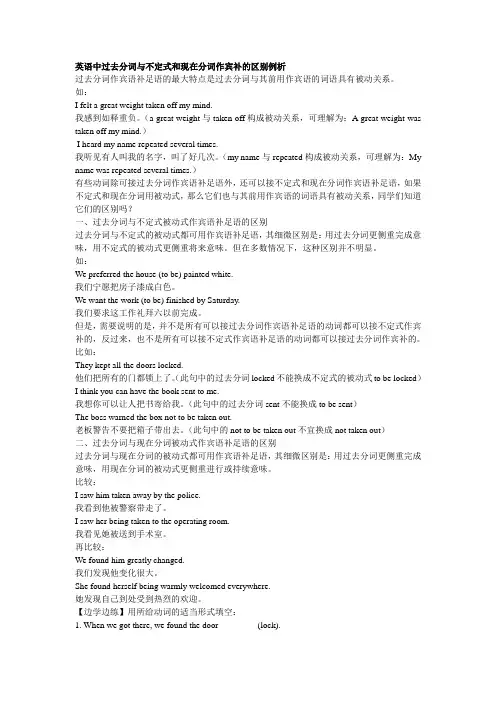
英语中过去分词与不定式和现在分词作宾补的区别例析过去分词作宾语补足语的最大特点是过去分词与其前用作宾语的词语具有被动关系。
如:I felt a great weight taken off my mind.我感到如释重负。
(a great weight与taken off构成被动关系,可理解为:A great weight was taken off my mind.)I heard my name repeated several times.我听见有人叫我的名字,叫了好几次。
(my name与repeated构成被动关系,可理解为:My name was repeated several times.)有些动词除可接过去分词作宾语补足语外,还可以接不定式和现在分词作宾语补足语,如果不定式和现在分词用被动式,那么它们也与其前用作宾语的词语具有被动关系,同学们知道它们的区别吗?一、过去分词与不定式被动式作宾语补足语的区别过去分词与不定式的被动式都可用作宾语补足语,其细微区别是:用过去分词更侧重完成意味,用不定式的被动式更侧重将来意味。
但在多数情况下,这种区别并不明显。
如:We preferred the house (to be) painted white.我们宁愿把房子漆成白色。
We want the work (to be) finished by Saturday.我们要求这工作礼拜六以前完成。
但是,需要说明的是,并不是所有可以接过去分词作宾语补足语的动词都可以接不定式作宾补的,反过来,也不是所有可以接不定式作宾语补足语的动词都可以接过去分词作宾补的。
比如:They kept all the doors locked.(此句中的过去分词locked不能换成不定式的被动式to be locked)他们把所有的门都锁上了。
I think you can have the book sent to me.我想你可以让人把书寄给我。
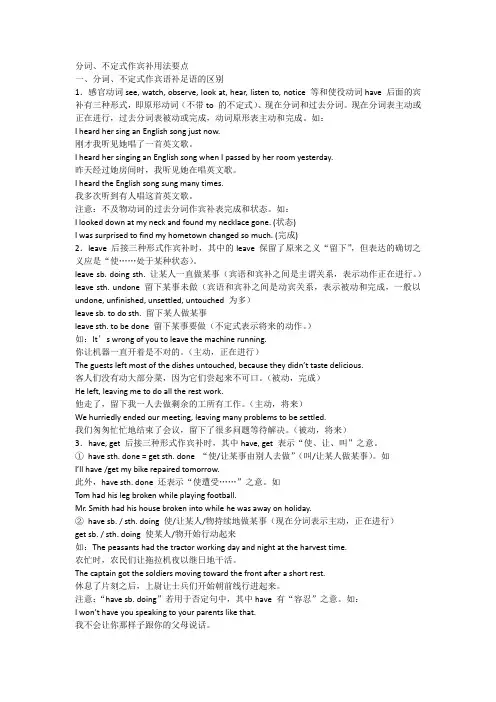
分词、不定式作宾补用法要点一、分词、不定式作宾语补足语的区别1.感官动词see, watch, observe, look at, hear, listen to, notice 等和使役动词have 后面的宾补有三种形式,即原形动词(不带to 的不定式)、现在分词和过去分词。
现在分词表主动或正在进行,过去分词表被动或完成,动词原形表主动和完成。
如:I heard her sing an English song just now.刚才我听见她唱了一首英文歌。
I heard her singing an English song when I passed by her room yesterday.昨天经过她房间时,我听见她在唱英文歌。
I heard the English song sung many times.我多次听到有人唱这首英文歌。
注意:不及物动词的过去分词作宾补表完成和状态。
如:I looked down at my neck and found my necklace gone. (状态)I was surprised to find my hometown changed so much. (完成)2.leave 后接三种形式作宾补时,其中的leave 保留了原来之义“留下”,但表达的确切之义应是“使……处于某种状态)。
leave sb. doing sth. 让某人一直做某事(宾语和宾补之间是主谓关系,表示动作正在进行。
)leave sth. undone 留下某事未做(宾语和宾补之间是动宾关系,表示被动和完成,一般以undone, unfinished, unsettled, untouched 为多)leave sb. to do sth. 留下某人做某事leave sth. to be done 留下某事要做(不定式表示将来的动作。
)如:It’s wrong of you to leave the machine running.你让机器一直开着是不对的。
宾语补足语七种类型及要点宾语补足语七种类型:名词做宾语补足语,形容词做宾语补足语,介词短语做宾语补足语,动名词短语做宾语补足语,不定式做宾语补足语,过去分词做宾语补足语,副词做宾语补足语。
1.名词作宾语补足语例如:We call her Goldilocks.我没叫他小金锁。
2.形容词作宾语补足语例如:My work keeps me busy.我的工作叫我忙个不停。
3.介词短语作宾语补足语例如:I left a case on the train.我落了个箱子在火车上。
4.动名词短语作宾语补足语例如:Don't keep me waiting too long.不要让我怎么样、5.不定式作宾语补足语例如:I asked him to help me.我要他帮我。
6.过去分词作宾语补足语例如:Could you make yourself understood?你能让自己被理解吗?7.副词作宾语补足语例如:Don't let your parents down.不要让你的父母失望。
宾语补足语适用类型:1.在表示心理状态的动词后作宾语补足语。
这类动词有:consider,think,believe,discover,find,imagine,judge,suppose,prove等。
这类动词后的不定式通常是“to be+形容词或名词”结构,think,consider,find后的to be常可省略。
例如:We consider him (to be) a good teacher.我们认为他是一个好老师。
2.在表示情感状态的动词后作宾语补足语。
这类动词有:love,like,prefer,hate,want,wish,expect等。
例如:I'd prefer you to leave him alone.我希望你不要打扰他。
3.注意:hope,demand,suggest等动词后面不能接不定式作宾语补足语。
现在分词与过去分词的用法分词作为英语语法的一种形式,在句子中起到了重要的作用。
其中,现在分词和过去分词是两种常见的形式,在句子中可用于表示动作或状态的变化。
本文将详细介绍现在分词和过去分词的用法及示例。
一、现在分词的用法1. 现在分词作状语现在分词可用作状语,修饰主句中的动词或整个句子。
它可以表示伴随、原因、结果等关系。
例1:Walking in the park, she enjoyed the beautiful scenery.(伴随关系)例2:Being tired, he decided to take a break.(原因关系)例3:The car crashed into a tree, killing the driver instantly.(结果关系)2. 现在分词作定语现在分词可以形容名词,作为定语修饰名词。
例4:The crying baby woke up the whole neighborhood.(形容词)例5:The running water sounded soothing.(形容词)3. 现在分词与现在分词短语现在分词与现在分词短语可以作主语、宾语、表语、宾补等。
例6:Smiling is contagious.(主语)例7:I saw him playing basketball in the park.(宾语)例8:Her main duty is taking care of the patients.(表语)例9:They kept the fire burning all night.(宾补)二、过去分词的用法1. 过去分词作定语过去分词可以修饰名词,作为定语使用。
例10:The broken window has been fixed.(形容词)例11:I visited the abandoned house yesterday.(形容词)2. 过去分词与过去分词短语过去分词与过去分词短语可以用作被动语态、完成时态、副词等。
分词分词包括现在分词和过去分词,分词做状语属于非谓语动词的内容,是高考的重点之一,也是学生易错点,现就历年常见题型及学生易错点总结如下,以便学生掌握。
现在分词和过去分词的主要区别在于:现在分词表示"主动和进行",过去分词表示"被动和完成"(不及物动词只表示完成不表示被动).分词作宾语补足语。
1.现在分词和过去分词都可以作宾语补足语。
在5看(look at, see, watch, notice, observe);3使(make, let, have);2听(listen to, hear);1感觉(fell)。
,此外find, catch, keep, have.I heard a girl crying next door.I heard someone knocking at the door.He kept me waiting for a long time.I saw Tom entering the room.I found my key lost.I found the boy beaten black and blue.He made himself understood.John will get his room painted.Exercises1:1) I heard my name ________________ ( call).2) His voice was too low to make himself ________________(hear) .3) We found the eggs_________________( eat) by the snake.4) Y ou’d better have/get your hair ______________ ( cut).5) I had my left arm________________(break) yesterday.ExercisesII:141. She was glad to see her child well __________.A. take care ofB. taken care ofC. taken careD. taking care of142. Why do you stand and watch the milk __________.A. boilingB. boiledC. from boilingD. having been boiled 143. I’ve heard him __________ about you often. A. spoke B. speaking C. speak D. to speak 144. Before he came to London, he had never heard a single English word __________.A. speakingB. spokenC. speakD. being spoken145. Walking along the river, we heard someone __________ for help.A. shoutingB. shoutC. shoutedD. having shouted146. I held the little bird in my hand and felt its heart __________.A. jumpingB. beatingC. bumpingD. knocking147. ---“Do you smell anything unusual?” ---“Y es. I can smell something __________.”A. burningB. is burningC. having burntD. burn148. Why do you have the water __________ all the time?A. ranB. to be runningC. runningD. being running149. Ellen was absent this morning because she had her tooth __________.A. fillingB. having been filledC. filledD. full150. I can’t ______ you running up and down all day long. A. permit B. let C. have D. allow 151. Is there anything you want from town? I’m going to get __________.A. those letters mailedB. mailed lettersC. to mailed those lettersD. those letters mail152. The teacher got the students __________ all the words they didn’t know.A. looked upB. looking inC. to look upD. look at153. What did the school master want __________ to the noisy children?A. doingB. to doC. doneD. did154. They wanted the work _______with great care. A. to have done B. to be done C. doing D. to do 155. I need this chapter _______ before tomorrow. A. rewriting B. rewritten C. rewrite D. to write again156. Having read the Emperor’s New Clothes, we all found it __________.A. interestB. interestedC. interestingD. to interest157. When she returned home, she found the window open and something __________.A. to stealB. losingC. missedD. stolen158. My hometown is found __________.A. complete changingB. having completely changedC. completely changepletely changed 159. We found many people __________ in the meeting room.A. seatB. seatingC. to seatD. seated160. There was so much noise that the speaker could not make himself _________.A. being heardB. heardC. hearingD. hear161. Because of my poor English I’m afraid I can’t make myself _________.A. understandB. be understoodC. understoodD. understanding162. Don’t let him __________ you __________ for a long time.A. to make, waitB. make, to waitC. make, waitD. to make, to wait163. He kept me __________ for many hours.A. to waitB. having been waitedC. waitingD. waited164. Mother caught the boy _____in the corner. A. smoke B. to smoke C. smoking D. being smoked 165. John left his coat __________ on the sofa.. A. laying B. lying C. laid D. lain答案:141-145 BACBA 146-150 BACCC 151-155 ACCBB156-160 CDDDB 161-165 CCCCB分词做状语主动被动1) 一般式writing being written2) 完成式having written having been written1. Feeling tired, Tom went to bed early.2. Not wanting to wake her, Steve left the house silently3. Having finished his homework, he went out.4. Asked by my mother, I was eager to help her solve the snake problem.5. Having been told many times, she still can’t remember it.6. Given more time, I can do it better现在分词或分词短语做状语时,也可以表示时间、原因、结果、条件、让步、方式、伴随状况等.其逻辑主语必须和句子的主语一致,有时with\without +名词或代词宾格+分词也可以表示伴随状况如: While reading the book, he nodded from time to time. (时间)The teacher stood there, surrounded by the students. (方式)He sent me an e-mail, hoping to get further information.(伴随)分词作时间状语,如果先与主动词的动作,且强调先后,要用having done。
现在分词、过去分词作定语、宾语补足语、状语时的区别(一)现在分词\过去分词作定语的区别.The mobile phone lying on the desk belongs to me.=The mobile phone which is lying on the desk belongs to me.(the mobile phone 和lie为主谓关系,即主动关系,故用现在分词)The injured suffering from the shock in the traffic accident were lying in the hospital.=The injured who suffered from the shock in the traffic accident were lying the hospital。
(the injured 和suffer 为主谓关系,即主动关系,故用现在分词)The house built 50 years ago will be pulled soon.=The house which was built 50 years ago will be pulled soon.(the house 和build为动宾关系,即被动关系,故用过去分词)The mobile phone laid on the desk belongs to me.=The mobile phone which is laid on the desk belongs to me.(the mobile phone 和lay 为动宾关系,即被动关系,故用过去分词)小试牛刀:1.The student ________________( speak) to the teacher now is our moniter.2.The problem _______________( discuss) yesterday is of great importance.3.The machine ________________( repair ) yesterday is broken again.4..The guests ________________(invite) to the meeting were all specialists.5.China is a country _______________(belong )to the 3rd world.6 .He lives in the house _______________( face ) the north.7.The temple ________________( stand ) on the top of the hill was built 500 years ago.8.The students ________________( want ) to join the club will gather at the gate.9.The car ____________________(make ) in Japan is of high quality.10.A checking delegation ( 代表团)______________( consist ) of 5 people are visiting our school.A checking delegation ( 代表团)_____________( make) up of 5 people are visiting our school.11. The student________________( focus )on his lesson is best in our class.The student _______________ ( lose )in his lesson is best in our class.12.Can you see the boy _________________ ( dress )in a red shirt?Can you see the boy __________________( wear ) a red shirt?13.The students ____________________( sit ) in Row I see the blackboard clearlyThe students __________________( seat ) in Row I see the blackboard clearly.14. The country _____________ ( lie ) to the east of Shandong Peninsula (半岛) is South Korea.The country _____________(locate ) to the east of Shandong Peninsula (半岛) is South Korea.( 辅助信息:Our school is located in the centre of the town)(二)现在分词、过去分词作宾语补足语的区别find ,make,feel,keep,leave,have ,see,observe,notice,watch,hear 。